Byzantium
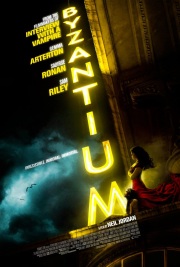
Eleanor (Ronan) is your typical sixteen-year-old. She’s obsessed with her diary, scared of boys, and has a strained relationship with her haranguing mother Clara (Arterton). She’s also an immortal blood-sucking creature who has been alive for two hundred years – but that’s almost beside the point. Her story opens with Clara murdering a man who has been tailing the two of them, leading both to go on the run. The women end up in a seaside town where Clara quickly seduces the owner of a rundown hotel named Byzantium, reclaims the building as a brothel, and swears Eleanor to secrecy about their true identities – something challenged when Eleanor strikes up a friendship with local oddball Frank (Caleb Landry Jones). Soon enough, the inhabitants of the town are growing suspicious about Clara and her “sister” Eleanor, while a threat from the women’s past draws ever closer.
In an age of Twilight rip-offs and werewolf soaps, what sets Jordan’s film apart is its approach to the vampire lore. Here, vampires aren’t bumpy-headed, glittering fang monsters. Yes, they prefer the night and, yes, they have superhuman strength, but when you cut their heads off they don’t turn to dust or splatter the walls with red goo (thank you True Blood). Writer Moira Buffini’s imagining is far simpler and thereby works far better as an analogy – in this case, Arterton’s Clara isn’t so much a creature of the night as a lady of the night. She looks entirely human, she can go out in the day and she’s just as subject to the pitfalls of modern life as everyone else. Indeed, at times Jordan’s film isn’t so much a vampire flick as a story about the survival of two young women with no money and no prospects.
Byzantium is also a film that questions how much the role of women has changed in society over the past two centuries. His and Buffini’s answer, sadly, is that it’s changed hardly at all. Perhaps the real tragedy of the film is that even after two hundred years on Earth, Clara is still selling her body for money; no matter how much time passes she seems unable to recover from her past traumas and learn that a woman’s sexuality is not her only tool. Her daughter, by contrast, never surrenders herself to the power of men – indeed, if you were looking for a deeper meaning here, Eleanor is the modern woman striking out for herself; a feminist icon shedding the deep set misogyny of past generations.
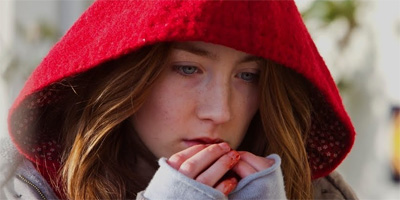
Though perhaps Buffini missed a trick here – surely the more interesting mother/daughter relationship to pursue would be one where the daughter is the same age or older – the central dynamic of Byzantium works beautifully; an emotional foundation upon which the rest of the film balances. Clara is demonstrably the more immature of the two, far more subject to her emotions and far less moral. She’s hotheaded, sensual, and vulnerable. A tart with a stopped heart, if you will.
Against Arterton, and indeed most of performances here, Saoirse Ronan is a suitably restrained, stoic lead who helps to anchor the time-hopping storyline. It is Eleanor who asks the questions on our behalf, and with Ronan as the still centre, the other cast members are allowed to stray in the direction of the comic, the emotional and the outrageously villainous. Around Ronan whirls a Cockney, busty Arterton, locking swords with Sam Riley’s morally ambiguous Darvell, Tom Hollander’s wet blanket drama teacher and – worst of all – Jonny Lee Miller’s syphilitic scoundrel Ruthven, the seriously weak link in an otherwise excellent cast. The result is a shifting, explosive, occasionally jarring tone that nonetheless captures your attention and keeps hold of it.
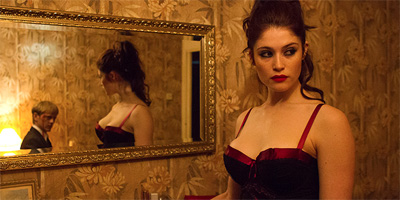
Neil Jordan’s film, all in all, manages to do something fresh with a tired format, posing questions we have not yet encountered and reinvigorating the vampire mythology. But most of all, it’s a film in which you find yourself rooting desperately for both leads to survive and, beyond that, to heal and become happy. Byzantium has somehow managed to be, against all the odds and fairly ironically when you think about it, a film with a truly human heart.

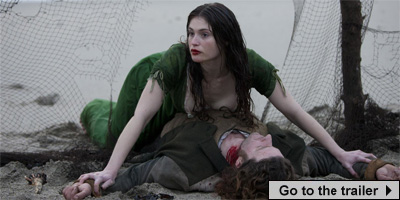

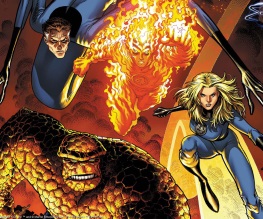
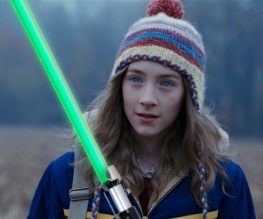
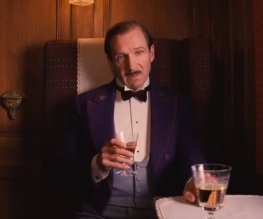
Recent Comments